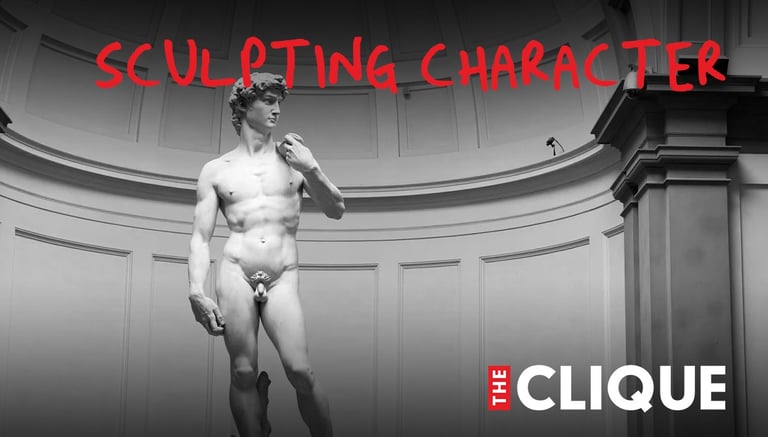Sculpting your character.


// Lunch Club
It was the first You Are the Media lunch club of the new season this week and the topic was on Character.
These events aren’t like normal business networking events as the topics don’t follow the formulaic ‘How to’ or ‘Discover this’ model which has become the standard in business events - learning doesn’t need to be practical all the time, it can be theorectical and it can be based on topics which apply to everyone - which is why I love the lunch club formats.
There is no subject knowledge expert teaching you about one specific topic - it’s all about the real world experiences we all face and this week was no different.
Character is a broad subject and the panel (expertly led by Westrow Cooper) was able to distil it down to a few points which I enjoyed - the overall premise was one of experiences, traits and your gut feeling (I won’t ruin it for those who didn’t attend).
But I wanted to share my own perspective on ‘Character’ as I think you can sculpt and create the character you want to be associated with.
For me, character is a set of moral and mental qualities that make an us unique.
It includes traits like honesty, empathy, and resilience. These traits influence how we face challenges, interact with others, and make decisions and your character shows who we are in tough situations and how we treat people who aren’t as fortunate as ourselves.
It shapes our values, goals, and causes we support, and it affects our reputation in our communities, impacting our relationships with friends, family, and colleagues.
I belive that ultimately, character is the foundation of our actions and choices, guiding our personal growth and ethical behavior.
// Life as a Sculptor
When I was in my late 20’s, early 30’s, I was faced with an identity crisis and I thought the world was conspiring against me - I was about to go through a divorce and I was at risk of losing contact with my eldest son (the usual things that happen with divorce unfortunately).
I was also going through somewhat of a decision crisis with work - again, I wasn’t really putting in the effort and I thought the management of the company were against me (they probably were but I won’t go into that).
The thing is, with both of those situations - I was blaming everyone else and not taking a look at the actions I could take which could help me out - I had a typical victim mentality and I needed to change it.
I want to tell you that I did some deep soul-searching and that I took a long deep hard look in the mirror but honestly, unless you’re David Goggins, I don’t think that type of work actually helps. Instead, I muddled through like every other human does and tried to make the best of a bad situation and it wasn’t until I was boxed in and needed to make some decisions that I actually showed up and realised I needed to take responsibility (I’m sure we’ve all done this).
Let me explain - I attended a ‘Relate’ counselling session to help resolve conflict with my ex-wife and understand the best ways to communicate and it wasn’t until I was shown that my actions were causing problems that I realised that I needed to change - two people shouting causes an argument, one person shouting is just plain insane and since I got that advice, I never raised my voice or got into an argument again.
This adaption, learning and change is what I mean when I say you can sculpt your character and only through experiences (challenges or successes) can you get the tools to sculpt your character in the ways you want to.
I am a firm believer in you being in control of how you are seen and act in this world - it’s your sole responsibility to be the person the world wants to see, not have the world adjust to how you want to act.
During this period, I exhibited frustration due to the lack of understanding in how to deal with a particular situation and this is where we need to seek help and understand how we should work.
// Success vs Failure
Every challenge, success and failure play a significant role in shaping our character throughout life as every experience contributes to our growth and understanding of ourselves and the world around us.
Challenges test our resilience and determination and they push us to confront our limitations and vulnerabilities - this is what I faced when I was going through troubles in my divorce but it did prompt me to look in the mirror and adjust.
On the other hand, successes reinforce our abilities and can boost our self-esteem. When you have some form of success, it serves as a validation of our efforts and means your ready for more challenges.
Having a failure shapes your character - you get the lessons that successes can’t give you.
This is where I fell and landed when I was going through an early life challenge - humility and a very stark reminder of my own imperfection was a wake up call but it did allow me to reshape my thinking and go again. When I was learning to cope with disappointment, I think I unlocked a new level of emotional intelligence and resilience which, without failure, I could never have reached.
// The Constant Trait
The panel at the You Are The Media event all agreed on a fundamental part of their identity which they described as their ‘gut feel’.
I believe you have a set of core identity traits which are a fundamental part of your identity - it’s something that’s embedded from birth, a core essence.
These core identity traits act as an inner compass because while life experiences shape and influence how we express ourselves, these traits remains steady and never change. They help guide your responses and decisions, grounding you when you experience change.
It’s the unchanging part of your character, an instinctual element that consistently aligns with who you are at your core.
When you face circumstances that you can’t control, those experiences that are outside of your experiences - our initial reaction is linked to our core identity traits.
I believe it definitely comes from your parents - the values your parents hold (or subject you to) are ingrained in your personality and you cannot change them. There has never been something more true than ‘you’re a product of your environment’.
Your gut feel (that’s what we’ll call it from now on) is formed early on and it’s a guide to your inner voice on what’s acceptable and what’s not - when you’re faced with uncertainty or a fight/flight moment, you immediately revert back to how you’re set up to behave.
That’s why some people in critical situations panic and run around without a sense of what to do and that’s why others exhibit behaviour which allows them to seperate themselves from the stress and they are able to see a sensible path through the panic.
Your gut feel is formed through the values and experiences you absorb from a young age, from school teachers and your parents - shaping an innate instinct that guides your actions.
I think it’s way more than just a snap judgment as it’s the result of deep-seated beliefs and behaviors that have been ingrained over time.
When life throws uncertainty your way, your gut feel instinctively knows what aligns with your identity - Your core traits will always influence how you react, whether you realize it or not - it’s an unspoken guide that keeps you grounded.
Over time, as you grow and encounter new challenges, this gut feel remains your constant, subtly guiding you toward what feels right, even when logic or circumstances might push you elsewhere and it's your internal voice, tuned by life’s experiences but set in motion by early lessons, values, and perhaps even those inherited family traits you didn't realize were shaping you.
// Conclusion
As life shapes us through experiences - work, relationships, challenges - we develop traits like empathy, resilience, or adaptability.
These traits evolve based on how we respond to the situations life presents but there’s often one core instinct, the “gut feel,” that never changes, no matter how much we grow. It serves as the foundation of who you are, guiding decisions and reactions.
For me, going through major life changes and even my experiences in the Army have all shaped how I react to life - it’s given me experiences to call upon when things. get tough.
These lessons and experiences help in other areas of my life (or hinder) - as an example, laying under a landrover in Iraq, wearing a gas mask for 48hrs was a stressful and difficult experience but when I get a red-topped electricity bill (I don’t nowadays, it’s an example) the stress level just isnt the same and I’m able to react appropriately.
I’ve made mistakes, I’ve had successes but overall, I try to live a good honest life and that’s grounded in my upbringing, my life starts and my early lessons.
It's worth asking yourself - what part of you never wavers? The answer might just lead you to discover the foundation of who you really are and how you navigate through life.


